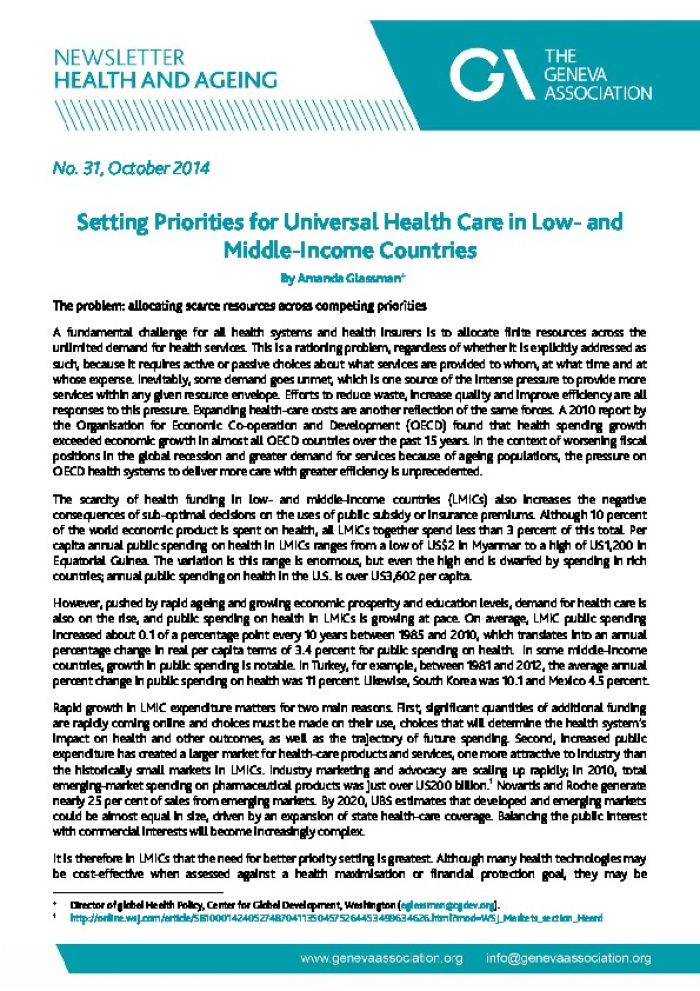Setting Priorities for Universal Health Care in Low- and Middle-Income Countries
Health & Ageing Newsletter 31: Amanda Glassman reviews the fundamental challenge for all health systems and insurers to allocate finite resources across the unlimited demand for health services.

No. 31, October 2014 Setting Priorities for Universal Health Care in Low- and Middle-Income Countries By Amanda Glassman+ The problem: allocating scarce resources across competing priorities A fundamental challenge for all health systems and health insurers is to allocate finite resources across the unlimited demand for health services. This is a rationing problem, regardless of whether it is explicitly addressed as such, because it requires active or passive choices about what services are provided to whom, at what time and at whose expense. Inevitably, some demand goes unmet, which is one source of the intense pressure to provide more services within any given resource envelope. Ef forts to reduce waste, increase quality and improve efficiency are all responses to this pressure. Expanding health -care costs are another reflection of the same forces. A 2010 report by the Organisation for Economic Co -operation and Development ( OECD) fou nd that health spending growth exceeded economic growth in almost all OECD countries over the past 15 years. In the context of worsening fiscal positions in the global recession and greater demand for services because of ag eing populations, the pressure on OECD health systems to deliver more care with greater efficiency is unprecedented. The scarcity of health funding in low- and middle -income countries (LMIC s) also increases the negative consequences of sub -optimal decisions on the uses of public subsidy or insurance premiums. Although 10 percent of the world economic product is spent on health, all LMIC s together spend less than 3 percent of this total. Per capita annual public spending on health in LMIC s ranges from a low of US $2 in Myanmar to a high of US 1,200 in Equatorial Guinea. The variation is this range is enormous, but even the high end is dwarfed by spending in rich countries; annual public spending on health in the U. S. is over US 3,602 per capita. However, pushed by rapid ag eing and growing ec onomic prosperity and education levels, demand for health care is also on the rise, and public spending on health in LMIC s is growing at pace. On average, LMIC public spending increased about 0.1 of a percentage point every 10 years between 1985 and 2010, which translates into an annual percentage change in real per capita terms of 3.4 percent for public spending on health. In some middle -income countries, growth in public spending is notable. In Turkey, for example, between 1981 and 2012, the average annu al percent change in public spending on health was 11 percent. Likewise, South Korea wa s 10.1 and Mexico 4.5 percent. Rapid growth in LMIC expenditure matters for two main reasons. First, significant quantities of additional funding are rapidly coming online and choices must be made on their use, choices that will determine the health system?s impact on health and other outcomes, as well as the trajectory of future spending. Second, increased public expenditure has cre ated a larger market for health- care products and services, one more attractive to industry than the historically small markets in LMIC s. Industry marketing and advocacy are scaling up rapidly; in 2010, total emerging -market spending on pharmaceutical products was just over US 200 billion. 1 Novartis and Roche generate nearly 25 per cent of sales from emerging markets. By 2020, UBS estimates that developed and e merging markets could be almost equal in size, driven by an expansion of state health- care coverage. Balancing the public interest with commercial interests will become increasingly complex. It is therefore in LMIC s that the need for better priority setting is greatest. Although many health technologies may be cost -effective when assessed against a health maxim isation or financial protection goal, they may be + Director of global Health Policy, Center for Global Development, Washington ( aglassman@cgdev.org). 1 http://online.wsj.com/article/SB100014240527487041135045752644 53499634626.html?mod=WSJ_Markets_section_Heard